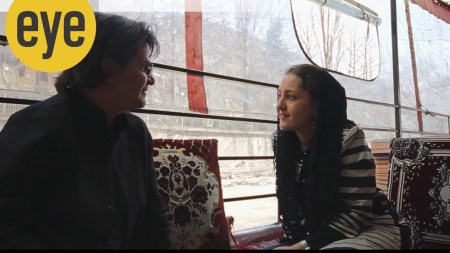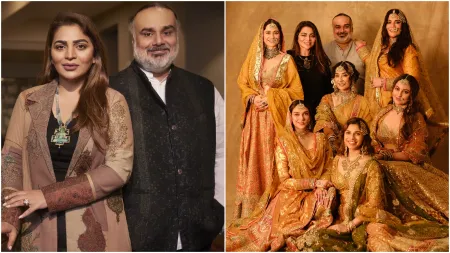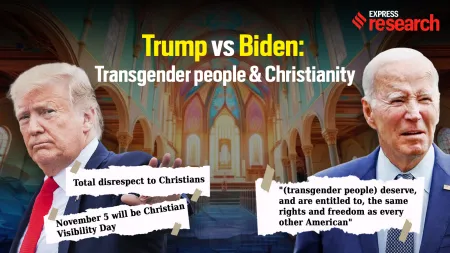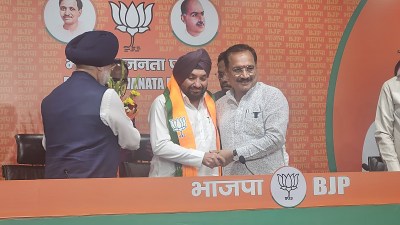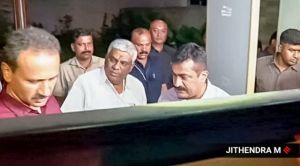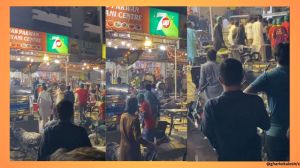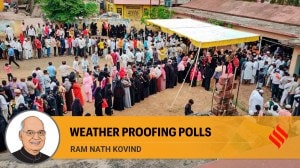- India
- International
Census to kranti: How Rahul Gandhi framed quotas as wealth re-distribution tool
For the BJP, already flagging what it calls the Congress’s “appeasement politics and economics,” it has now alleged that the growing middle class are threatened by such policy prescriptions, that their wealth too would be “grabbed” by the government.
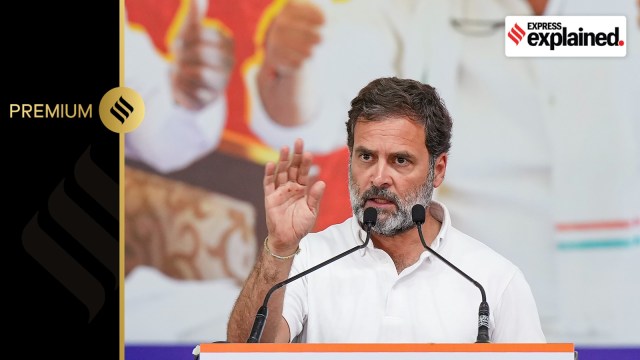 Congress leader Rahul Gandhi addresses an election campaign rally in the Mandya constituency in Karnataka on April 17, 2024. (PTI Photo/Shailendra Bhojak)
Congress leader Rahul Gandhi addresses an election campaign rally in the Mandya constituency in Karnataka on April 17, 2024. (PTI Photo/Shailendra Bhojak)Almost year ago, on April 16, 2023, Rahul Gandhi first spoke about jitni abadi, utna haq or proportional representation in Kolar, ahead of the Karnataka Assembly elections. Even after a win in the state, the Congress Working Committee, which met in October last year, refrained from spelling out this line. It passed a resolution merely saying a “nationwide caste census will reveal an accurate picture of the socio-economic position of communities across the country and provide a sound, data-driven basis for policies to strengthen the foundations of social justice and ensure inclusive development.”
This carefully worded statement is now effectively out of the window as Rahul has steadily ratcheted up the rhetoric, framing the caste census not just as a means but as an end — conflating the three critical issues of inequality, concentration of wealth, and caste census, leaving gaping holes for interpretation, to the dismay of a section of his colleagues.
Scroll down to play Express Games and test your knowledge about Indian elections
Over the course of the year, he has talked about an “X-ray”, a financial survey which will make everything clear — doodh ka doodh, paani ka paani — about who owns what and earns how much, and krantikari policies to achieve social justice and economic welfare. And when Sam Pitroda served the idea of inheritance tax for redistribution of wealth, it almost seemed Rahul Gandhi had prepared the ground for that.
For the BJP, already flagging what it calls the Congress’s “appeasement politics and economics,” it has now alleged that the growing middle class are threatened by such policy prescriptions, that their wealth too would be “grabbed” by the government.

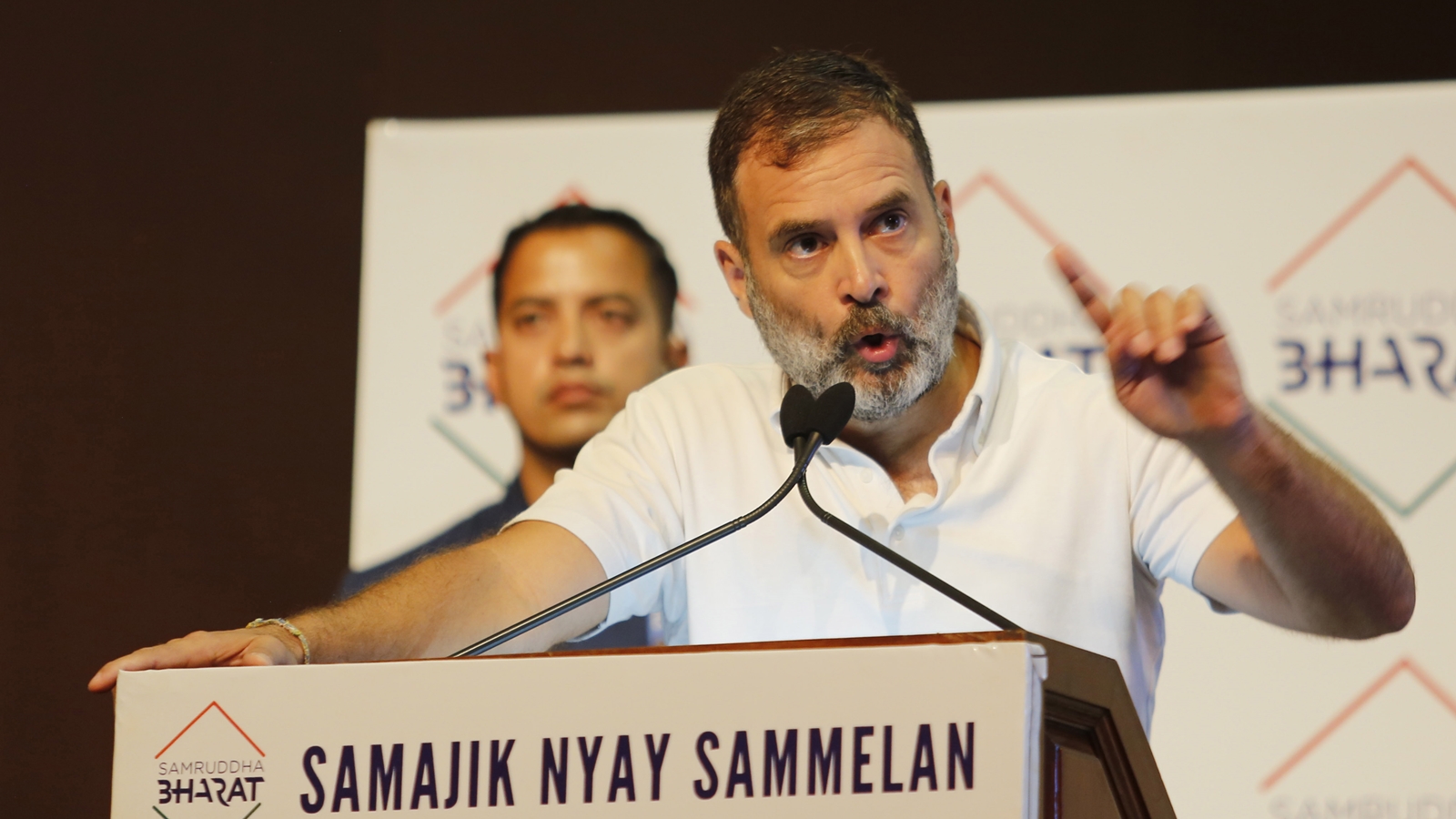 Congress leader Rahul Gandhi at the Samajik Nyay Sammelan in New Delhi on Wednesday. (Express photo by Anil Sharma)
Congress leader Rahul Gandhi at the Samajik Nyay Sammelan in New Delhi on Wednesday. (Express photo by Anil Sharma)
Some within the Congress are wondering if Rahul Gandhi’s political language has forced them into an intractable exercise of fire-fighting. A senior party leader, who was involved in the manifesto drafting exercise, distanced himself from Pitroda, “Does the manifesto talk about inheritance tax? In fact, it promises there will be no increase in income tax.”
“I am exhausted just defending the manifesto from both insiders and outsiders,” said another senior Congress leader who did not wish to be named.
Explaining Rahul Gandhi’s language, this leader said, “Clearly, he is trying to stoke anger among people, majority of whom, he believes, have not been able to participate in the economic growth of the country.”
He further said that in democracies worldwide and, even in India, redistribution of wealth has been the cornerstone of all governments. “How else do you explain the PM KISAN or NREGA… the few people who pay taxes are funding these programmes for the poor,” the leader said.
But Pitroda’s inheritance tax idea came at a time when the manifesto was seen as gaining traction, and had some interesting ideas like a one-year paid apprenticeship and income support of Rs 1 lakh for every poor household.
“Why isn’t the party disowning Sam Pitroda,” said another key member of then Prime Minister Manmohan Singh’s economic team, who did not wish to be named. Referring to the Congress response, he said: “This is a very weak rebuttal. Since the Congress manifesto explicitly says no new taxes, they should say his view is contrary to the party view. Of course, he has a right to express his views. Not clear what messaging the Congress is adopting.”
Pitroda, colleague of late Rajiv Gandhi, who helps organise Rahul’s tours to the US, had an interview to news agency ANI, said, “When we talk about redistributing wealth, we are talking about new policies and new programs that are in the interest of the people and not in the interest of the super-rich only.” Referring to the inheritance tax in America, he said, it was an interesting law and argued “these are the kind of issues people will have to debate and discuss.”
Rahul Gandhi, however, has been unapologetic, and dug his heels in. Arguing that no force can stop the caste census, he told a Samajik Nyay Sammelan on Wednesday, “As soon as we form the government… the first job would be holding a caste census…There will be clarity. Don’t think caste census is just caste survey. Woh jaati ka survey hai…but we will add economic and institutional surveys to that which means desh ko pata lag jayega…ki is jaat main itne log hain..dalit itne, adivasi itne, gareeb general caste itne…unki aamdani itni hai aur Hindustan ke sansthaon mai inki itni bhagidari hain.”
“So in a way it is a national X-ray and I feel after 70 years this is a much-needed step…that we assess what is the situation today after 70 years of independence and “iske baad hume kis direction mai jana chahiye. It is logical and no one can oppose it,” he said.
He was, however, silent on Pitroda’s remarks. A section of the party leaders said the “ill-timed” remarks and the framing of Rahul’s caste census pitch in a “Marxist” tone is portraying the Congress as moving back in time and out of sync with the aspirations of the young.
Indeed, when Rahul Gandhi first referred to the jitni abadi, utna haq idea last year, he had suggested that reservation for SCs and STs should be proportionate to their population and sought removal of the Supreme Court-mandated 50 per cent cap on reservation.
That, itself, was a big shift for the Congress. Representation in proportion to population had been a plank of socialist parties like the RJD, JD(U) and the SP, which have captive caste-based vote banks; not the Congress.
But the victory in Karnataka emboldened Rahul to push further. He then framed the caste census as an “X-Ray” of India in the run-up to the Chhattisgarh, Madhya Pradesh and Rajasthan Assembly elections.
Despite defeat in these states, he pressed on expanding the ambit of his argument during the Bharat Jodo Nyay Yatra which began on January 14. In February, as the Yatra criss-crossed Bihar, he said in Aurangabad that if the INDIA bloc is elected to power in 2024, it would conduct a caste census, along with a financial survey to know the situation and status on the ground.
On March 9, he said on social media platform X that the caste survey conducted in Bihar revealed that 88 per cent of the poor population comes from Dalit, tribal, backward and minority communities. “The figures that have come from Bihar are just a small glimpse of the real picture of the country. We do not even have an idea about the conditions in which the poor population of the country is living. That is why we are going to take two historic steps – caste count, economic mapping, on the basis of which we will uproot the 50 per cent cap on reservation.”
“Caste census and economic and financial survey…these are revolutionary steps… the Congress will include these in our manifesto… jaisi hi hamari sarkar aayegi hum isko poora karke aapko de denge… doodh ka doodh pani ka pani ho jayega,” Gandhi said addressing a rally in tribal-dominated Nandurbar district of Maharashtra on March 12.
Releasing the Congress manifesto in Hyderabad on April 6, he said a caste census would let the backward classes, Dalits, tribals and poor among the general castes, as well as minorities, know “what is their share in this country (is desh main unki bhagidari kitni hai)”
“We will hold a financial and institutional survey after that. Yeh pata lagayenge ki Hindustan ka dhan kiske hathon mein hai, kaun se varg ke haath mein hai. Aur is aitihasik kadam ke baad hum krantikari kaam shuru karenge… Jo aapka haq banta jai, woh hum aapke liye aapko dene ka kaam karenge (We will find out who holds the country’s wealth, what class of people. And after this historic step, we will take revolutionary measures… What is your right, we will ensure we get it for you),” he said, elaborating on the next steps.
This was going far beyond the manifesto and Pitroda adding his bit with the inheritance tax, brought back the old economic ghosts of the Congress and has prompted, in the middle of an election campaign, the party’s critics to talk of re-distribution and dis-inheritance.
More Explained
EXPRESS OPINION
May 04: Latest News
- 01
- 02
- 03
- 04
- 05







